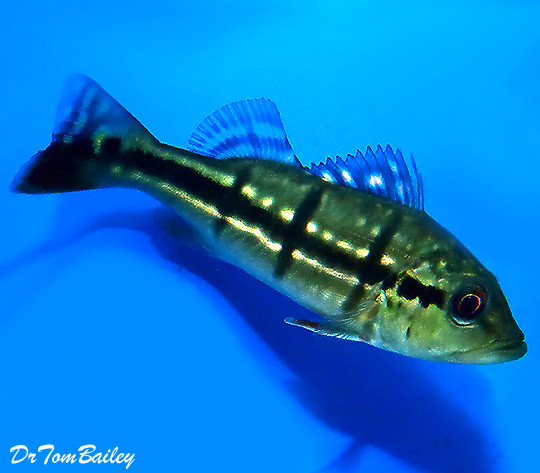
Premium Temensis Peacock Bass Cichlid, can grow to be very large.
Above: In the picture, a young premium quality Temensis Peacock Bass Cichlid is swimming in one of our aquariums, when one of us snapped this picture.
Origin: The ancestors of this fish lived in Northern South America in the Rio Negro, Rio Uatuma and Rio Orinoco basins in Colombia, Venezuela, Guyana and Brazil, but now they live in aquariums and ponds throughout the world.
Maximum Size: In very large aquariums these Temensis can grow to be over 30" long, including their tails, which is a very large size.
This fish also lives in large ponds.
Behaviors: Peacock Bass are usually not too aggressive but from time to time males have long energetic battles.
This fish will gulp down any fish that will fit into their mouths and there mouths are big.
Compatibility: Some recommended tank mates include other large South and Central American Cichlids, Synodontis Catfish, and large Plecostomus.
They will eat anything that will fit into their mouths.
Click here for more about Synodontis Catfish.
Click here to read more about compatible groups of pet fish.
Temperature: Peacock Bass live best from about 75 to 80-degrees F. with 78 being perhaps ideal.
Click here to learn about aquarium temperature, aquarium thermometers, and aquarium heaters.
Feeding: Premium Fish Food Pellets is the best food for this fish. Smaller sized pellets when they're small, and larger sized pellets when they're large.
Click here to learn more about and shop online for premium fish foods.
Water Conditions: These fish can adapt to many water conditions, and so as usual it's best not to try to change the pH or hardness.
Click here for a lot more information about aquarium water conditions.
Aquarium Size: when small a few Peacock Bass can live for a while in an aquarium with 30 to 60-gallons of water but will soon need a much bigger aquarium.
Eventually a single Peacock Bass will need a huge aquarium with at least 500-gallons of water.
An even bigger aquarium or pond is best.
Decor: most Peacock Bass eventually live in a pond or a bare aquarium with no gravel or plants.
Click here for more about aquarium gravel.
Live plants are beautiful and improve the water quality, but Peacock Bass will usually dig up and bulldoze plants, so most aquariums with large Peacock Bass do not have rooted plants but sometimes do have floating plants.
Aquarium Filter: Bio-Wheel Filters are highly recommended for aquariums up to about 250-gallons.
A 30 to 60-gallon aquarium with one or two Penguin 350B Filters is a good home for a few small Peacock Bass.
But soon they'll need a much bigger aquarium with as many Penguin 350B Filters as will fit across the back.
Eventually this fish will need to live in a large pond or in an aquarium with at least 500-gallon and a more complicated powerful filtering system.
Click here to learn more about aquarium filters.
The addition of Lava Rocks will keep nitrates in the ideal range.
Click here to learn more about using Lava Rocks in aquariums.
Life Span: Peacock Bass can live for several years.
Keep the water conditions excellent and feed them premium foods, and they can live for many years.
Gender: It's difficult to tell males from females, but a male will grow larger with longer more pointed fins, more coloration and usually grow a bump above his eyes.
Breeding: Peacock Bass are Substrate Spawners, the female lays eggs in the substrate usually on some flat rocks, then the male fertilizes the eggs, and the male stays to protect the eggs and later the fry.
We've found no reports of them reproducing in an aquarium, but they have been spawned many times in ponds by skillful fish farmers.
Click here for a lot more about breeding various tropical fish in aquariums.
Popularity: These fish are very popular game fish and are stocked in ponds to be caught with fishing poles.
They are also surprisingly popular as aquarium fish.
Names: The Peacock Bass are all members of the Cichla genus. But scientists disagree if there are just 2 or just 4 or many species.
The Temensis Peacock Bass has the scientific name Cichla temensis.
Variations: There are many variations of the Peacock Bass fish, and these variations are now thought to be closely related species or subspecies.
Some experts think there are just a few species, but other experts think there are several species.
We hope you've enjoyed reading these comments.
DrT - 01/21/2015
Why Us?
All of our fish are Premium Quality Fish from the best suppliers in the world. Our fish have better health, more energy and brighter colors, as you can see in our pictures on this website.
We have 380-aquariums with lots-and-lots of popular aquarium fish plus lots-and-lots of rare fish!
We consider ourselves to be the link between the world's best sources of fish and the world's best customers. We love our work, and we are very responsible about caring for our fish and then shipping them carefully.
We also offer lots and lots of information about keeping and caring for pet fish, all from the knowledge of the Bailey Brothers, who have a combined total of 100+ years of experience as breeders, wholesalers, and retailers of pet fish!
Our fish and our customers are treated with the best of care, and we work energetically everyday to make sure every customer enjoys their new fishy friends.
When you purchase pet fish from us, you know you're receiving premium quality fish and premium quality service.
"Received my fish last night and was so pleased! They all arrived alive and appeared to be healthy.
"Once in the tank, they became very active and are now thriving in their new home.
"Beautiful fish, I asked for color and aquariumfish delivered. Processing and shipping was extremely quick."

About AquariumFish.net

Nevin and DrTom, the Bailey Brothers
This website is owned and operated by the Bailey Brothers, DrTom and Nevin, who've been together in the fish business for more than 50-years.
The Product Manager has been with the company for more than 35-years.
So we feel very confident that this is the fishiest crew anywhere.
